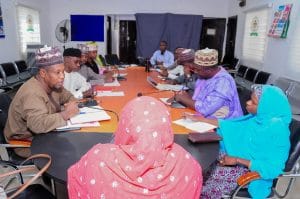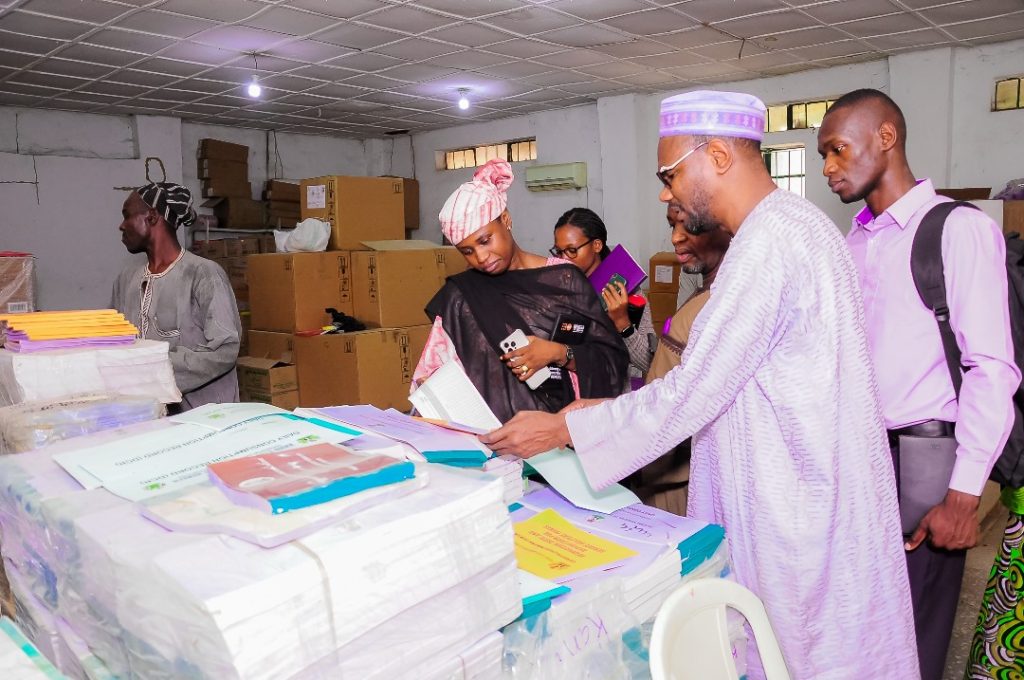The Africa Health Budget Network (AHBN), in collaboration with SAMASHA a non-governmental organization based in Uganda paid an advocacy visit to the Kano State Contributory Healthcare Management Agency (KASCHMA).
The visit aimed to update the agency on ongoing efforts to strengthen accountability in women’s health and to foster collaboration on family planning (FP) and maternal, newborn, and child health (MNCH) initiatives within the state.

Leading the delegation, Dr. Musa M. Bello commended KASCHMA for integrating family planning services into its healthcare service package.
He emphasized the importance of collaborative monitoring of FP services across health facilities to ensure transparency and accountability.
AHBN, SAMASHA Convene Stakeholders to Strengthen FP MNCH Accountability in Kano
In their separate remarks, Malam Aqibu Hamisu and Amina Haladu stressed the need for stronger partnerships with the National Health Insurance Scheme (NHIS) and both local and international organizations.
They highlighted the necessity of a multi-sectoral and multi-stakeholder approach to addressing FP and MNCH challenges.
Mrs. Gift from SAMASHA expressed appreciation to KASCHMA’s Executive Secretary, Dr. Rahila Mukhtar, for her leadership and dedication.
She called on Dr. Mukhtar to serve as a “Champion of Family Planning and MNCH” an initiative to recognize individuals who have significantly contributed to promoting family planning services.
In her response, Dr. Rahila Mukhtar warmly welcomed the delegation and reaffirmed KASCHMA’s commitment to equitable, affordable, and comprehensive healthcare delivery.
AHBN, AFENET Partners KNSG to Tackle Zero-Dose Challenges
She emphasized the critical role of family planning in improving maternal and child health outcomes, reducing maternal mortality, and promoting socio-economic development.
Dr. Mukhtar elaborated that KASCHMA’s benefits package now includes not only FP counseling but also the provision of consumables and commodities.
She also highlighted ongoing collaborations with partners such as UNFPA and NHIA, and emphasized that FP services are now being scaled across both primary and secondary healthcare levels.
Stressing the importance of sustainability and accountability, especially for underserved populations, Dr. MukhtarDr. Mukhtar appreciated her nomination as a Family Planning Champion and welcomed future partnerships with AHBN.
As part of their advocacy mission, the team also visited the Drugs and Medical Consumables Supply Agency (DMCSA) to assess the family planning commodities supply chain.
They advocated for strengthened multisectoral collaboration to improve logistics and ensure integrated service delivery.
The team was received by Pharmacist A.M. Bello on behalf of the Director General. He provided an overview of the FP commodities received from the Bill & Melinda Gates Foundation (BMGF) and distributed across state health facilities.
To address logistics challenges, he explained that FP commodities have been incorporated into the Drugs Revolving Fund system, enabling health facilities to request them seamlessly as part of their regular drug requisition processes.
The team also toured the storage facilities where these commodities are kept.
These advocacy efforts by AHBN and SAMASHA reflect a sustained commitment to advancing Universal Health Coverage and improving access to reproductive health services in Nigeria and Uganda.
The engagements also contribute to evidence generation and monitoring progress toward achieving the FP2030 commitments.





